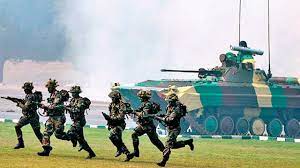NEW DELHI: Amid the continuing tensions with China along the Line of Actual Control (LAC) in Sikkim, Arunachal Pradesh and Eastern Ladakh, the Indian Army and the Indian Air Force (IAF) jointly conducted an exercise in the eastern sector to validate plans for carrying out a strategic airlift of special forces.
The exercise witnessed IAF planes and helicopters landing and dropping troops in designated areas for carrying out operations to “provide a surge” to the existing land forces. The Army said the exercise concluded last week.
“It was to validate integrated operations in a high-altitude and mountainous terrain. The exercise demonstrated speed and agility of the special forces, showcasing their ability to be rapidly deployed in a hostile environment. The troops were tasked with securing landing zones and engaging the enemy with precision and speed as per a laid-out plan to mimic a battle scenario,” an Army official said.
Air Force’s C17-Globemaster planes and Chinook and Mi-17 helicopters carried out the “insertion into designated landing zones with surgical precision”. Paratroopers from the 50th Parachute Brigade (Shatrujeet Brigade) carried out the helicopter-borne operations with an aim to validate the ability to rapidly deploy into a hostile environment as well as the jointness of the Para-Brigade and regular troops of the Eastern Command. The exercise was carried out in designated areas of the eastern sector. A defence official said such exercises were a mix of conventional and unconventional military actions that were undertaken by specially designated, selected, trained and equipped units of the Army.
The recent statement by Bhutan that it was “ready to draw out a line demarcating the boundary with China” has raised fears in India over the Chinese presence at Doklam plateau. Last week, Chief of Defence Staff (CDS) Gen Anil Chauhan visited forward areas in north Bengal and Sikkim to review infrastructure development and operational and logistics preparedness.
India fears that Bhutan, while resolving its boundary issue with China, could cede Doklam plateau and retain the areas to its north, which would mean China getting ensconced on Doklam plateau. This will allow it a clear view of the sensitive Siliguri corridor in north Bengal, which is a narrow tract of land connecting mainland India with the north-eastern states.
In Arunachal, the two sides were involved in a clash on December 9 last year along the disputed section of the LAC at Yangtse. This was the first physical clash between the two armies since August 2020. The Chinese have been trying to get access to the top of a 17,000-foot-high peak that provides commandeering view on both sides of the LAC. India is in firm control to the top.


